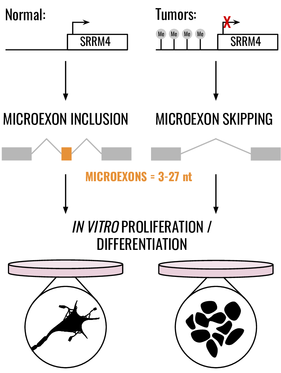Abstract
RNA splicing is widely dysregulated in cancer, frequently due to altered expression or activity of splicing factors (SFs). Microexons are extremely small exons (3–27 nucleotides long) that are highly evolutionarily conserved and play critical roles in promoting neuronal differentiation and development. Inclusion of microexons in mRNA transcripts is mediated by the SF Serine/Arginine Repetitive Matrix 4 (SRRM4), whose expression is largely restricted to neural tissues. However, microexons have been largely overlooked in prior analyses of splicing in cancer, as their small size necessitates specialized computational approaches for their detection. Here, we demonstrate that despite having low expression in normal nonneural tissues, SRRM4 is further silenced in tumors, resulting in the suppression of normal microexon inclusion. Remarkably, SRRM4 is the most consistently silenced SF across all tumor types analyzed, implying a general advantage of microexon down-regulation in cancer independent of its tissue of origin. We show that this silencing is favorable for tumor growth, as decreased SRRM4 expression in tumors is correlated with an increase in mitotic gene expression, and up-regulation of SRRM4 in cancer cell lines dose-dependently inhibits proliferation in vitro and in a mouse xenograft model. Further, this proliferation inhibition is accompanied by induction of neural-like expression and splicing patterns in cancer cells, suggesting that SRRM4 expression shifts the cell state away from proliferation and toward differentiation. We therefore conclude that SRRM4 acts as a proliferation brake, and tumors gain a selective advantage by cutting off this brake.
